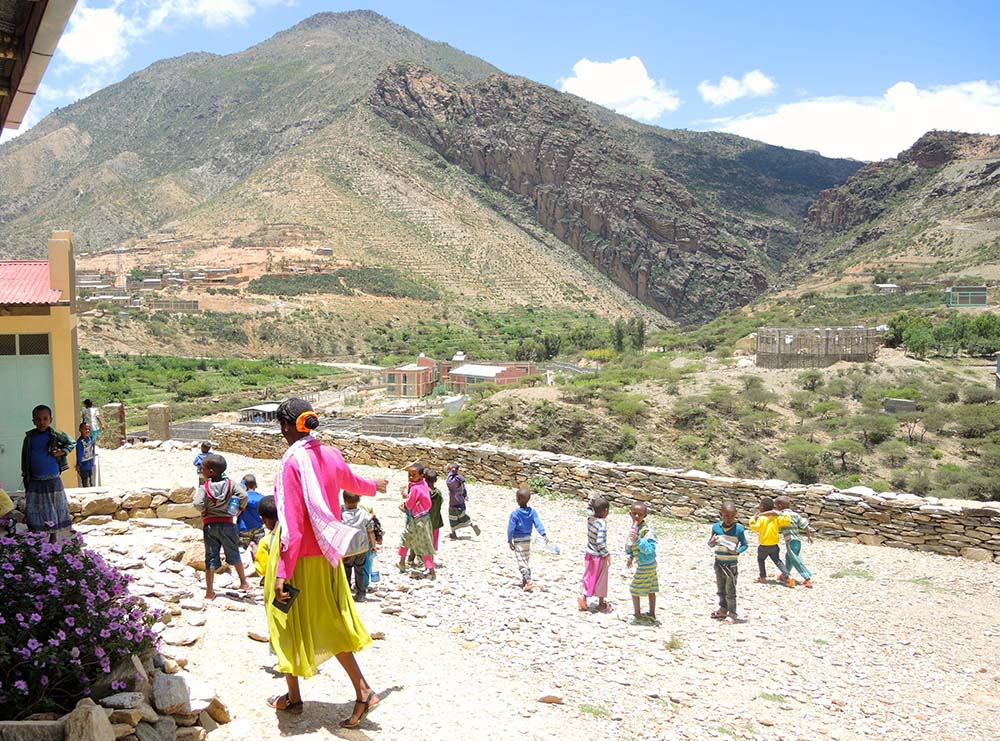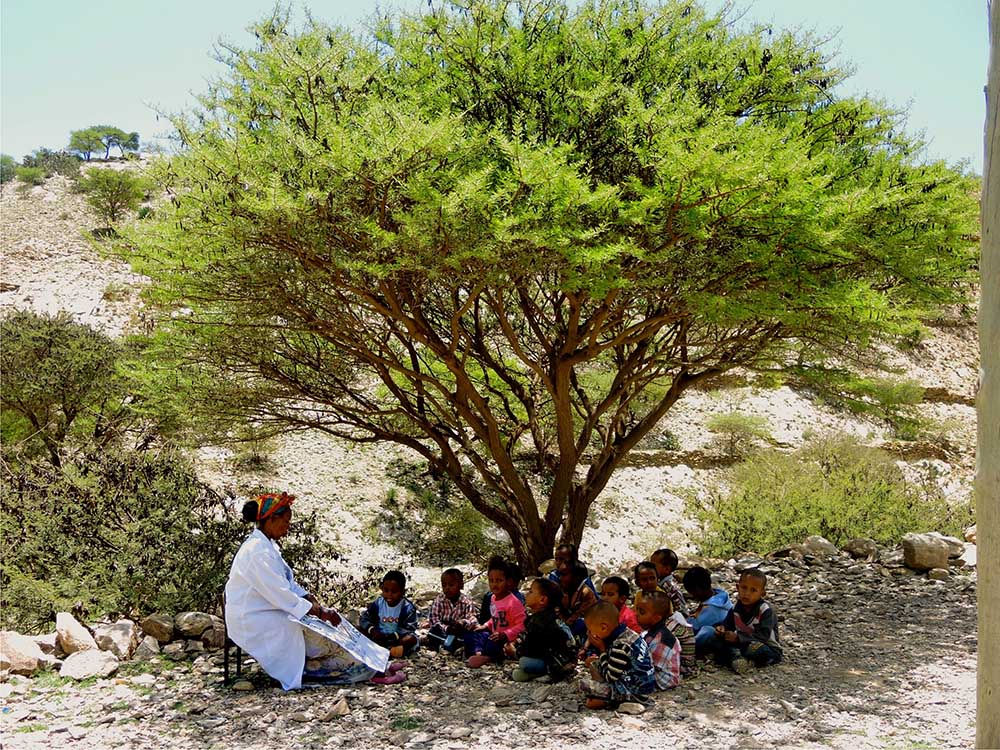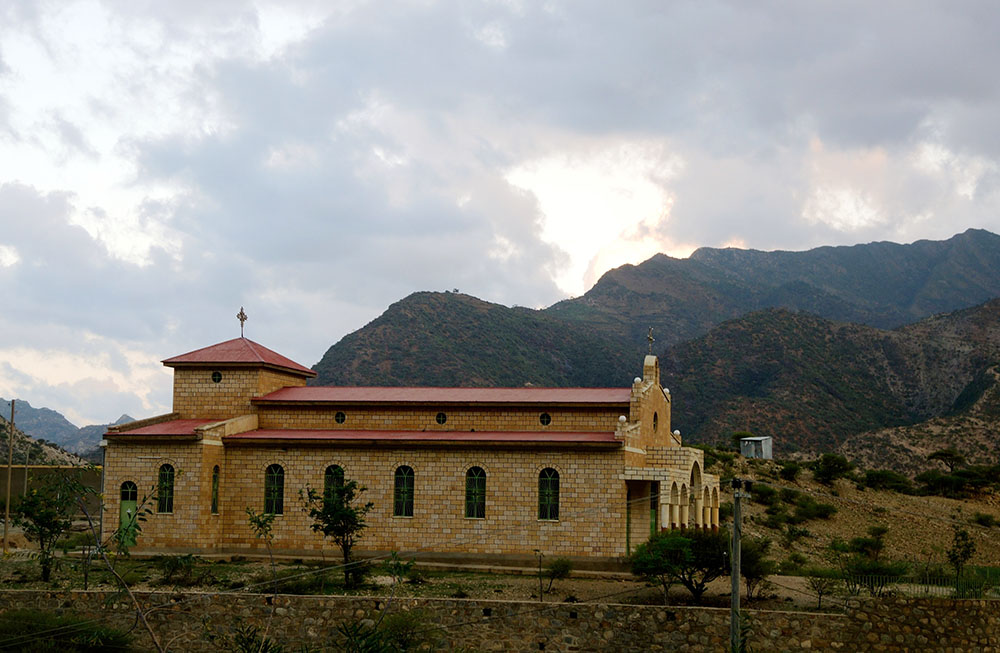
The landscape of Dawhan, Ethiopia, is seen beyond the Catholic kindergarten in 2016. (GSR photo/Melanie Lidman)
Editor's note: Last week's column describes how St. Louis Sr. Naomi Nkrumah and her team of missionaries had to flee Ethiopia during the civil war. As of April 8, they were able to go back to their missions. This column describes her early missionary work there and the environmental issues in that region.
I was a secondary school English teacher from Ghana when I volunteered for the Sisters of St. Louis mission in Ethiopia in 2018. I was excited, but also had some anxiety about going. Finally, I found myself in the Addis Ababa airport where Sr. Maureen Long'ep met and welcomed me warmly. The next day, we left for Dawhan, a small town established in 2003 after the war between Ethiopia and Eritrea. It is about 1,000 kilometers from Addis Ababa, in the Irob district of the Tigray region.
The journey to Dawhan was full of surprises; beautiful landscapes took my breath away — before the increasingly tortuous road conditions made me fearful as we traveled through mountains and deep valleys. It was amazing to see the communities and villages surrounded by such breathtaking natural scenery.
But I forgot my fear when I was given a hearty welcome by four of our sisters, with a sumptuous lunch together amid joy and laughter.
One thing that was especially hard for me at first was my inability to communicate with people. And for the first two months, I was oppressed and depressed by the mountains and the valleys surrounding us, but soon I began using the natural scenery to praise God, singing and praying each morning.
The area is impoverished due to drought, deforestation and overgrazing by cattle and goats. Few families can even grow vegetables. Limited space and rocky ground make it necessary to bury the dead in mats instead of coffins. Over 98% of the district's population lives on food aid provided by a national program set up decades ago in exchange for labor in land terracing; few are formally employed now.

A teacher gives a lesson to kindergartners under a tree in the courtyard of the school in Dawhan, Ethiopia, in 2016. (GSR photo/Melanie Lidman)
In spite of these disadvantages, the Irob people are strongly bonded, with little gap between the rich and the poor. Their simplicity of life is evident in shared celebrations of weddings, funerals and church feasts.
Many local men died in the war with Eritrea, but people live peacefully together, with low rates of crime or domestic violence in this resettlement village of mostly women who lost their husbands in the fighting, and single mothers impregnated by soldiers and left behind with the children.
Our sisters — who speak the local, regional and national languages — developed skills programs for the women and girls: embroidery, small business and animal rearing. They also introduced sanitation and environmental care skills, and a youth program in English and computers.
Except for travel or gathering in crowds, COVID-19 did not affect us as much as other parts of the country, though family members celebrate funerals, alone, very early in the morning and announce deaths by way of "town crying" — amazing in this 21st century.
Living in Ethiopia has convinced me that we have been called to take part in healing the suffering of Mother Earth, our common home, and to realize that through it all God is doing something new in our lives, particularly regarding climate.
Scarcity of rain, deforestation, poor soil, overgrazing and poor infrastructure have created an extremely impoverished area. Hard-working and simple farmers plant maize, wheat and barley, hoping something will grow.
Traditionally, the rainy season is from June to August, but in recent years, we saw hardly any rain during these months. For many years now, the women in the community have stayed after Mass in June to pray for rain. They carry stones on their heads in a procession around the church, as a sign of mourning and repentance, asking God's forgiveness and pleading for rainfall.

The Catholic church in Dawhan, Ethiopia (GSR photo/Melanie Lidman)
If rain delays, men will sometimes join the women, and if that fails, the priest and the entire congregation join the procession. These processions continue until the rains appear, then there are prayers for thanksgiving.
This ritual seems to have derived from ancient customs of Jewish and Orthodox cultures that have mingled into Ethiopian Catholicism. Ethiopia is one of the oldest official Christian nations in the world after Armenia, and the Irob district is a primarily Catholic zone with only a few Orthodox Christians and Muslims. Most of the women and men religious of Ethiopia are from this area.
During the COVID-19 pandemic year, however, something changed. Heavy rains fell in the district from May through August. We looked out on trees, grasses and flowers, noticing how the surrounding communities are all green. Was this really Dawhan we were seeing? We were happy for the grassy mountains and valleys, but our one big sadness was that there are few trees.
The elders reminisced about how the district used to be in the olden days when this Irob district was a heavily forested zone, covered with tall, green trees, a sign of good rains every year. We sisters know this memory is true because when we visited the Dawhan museum and tourist center, we found that the villagers' cooking utensils and arrows for hunting were made from wood. Now, these implements are made from iron and plastic.
The trees vanished because of overgrazing and indiscriminate cutting of trees for construction, firewood and charcoal production. Economic necessity led to increased livestock grazing and livestock food production, which also destroyed the forests. Few efforts were made to replant trees, leading to desertification.
People started wondering about the drastic change in rainfall and climate during this COVID-19 pandemic year. We sisters and some of the elders in the village agree that the new government regulations could be good for the environment.
Advertisement
When the government required people to stay at home, the small tree population could not be cut for domestic and economic purposes, particularly for charcoal production. The big trucks that used to collect charcoal and take it to the district and regional capitals no longer came, dramatically reducing both carbon and dust pollution in the district; we were often choked by the dust in the air.
People were limited in herding animals, traveling to their fields and shopping at markets. Now the grasses — which also take carbon out of the atmosphere — can grow again. And there have been some efforts to plant trees in the district, mandated in 2018 by the government for all regions. Our sisters also participated, led by Sister Perpetua — who holds a degree in agriculture — planting trees like moringa, neem, bitter leaf, olive, rose and mango.
Our community went to Dawhan in response to the mandates of the 2003 and 2009 chapters that challenged us to move further afield in Africa, to meet the needs of the poor and marginalized, with a nearby community of the Daughters of Charity. Living in that isolated place called both our communities to trust in God, and the pandemic presented us many opportunities to become even more involved in the local community and find ways to trust that God was doing new things among us.
I believe that God is doing something new in my life. I learned so much from the culture of the people, their mode of worship, the environment and my community members. I pray that we can return after the war to continue to "move out of our comfort zones and be prophetic risk-takers and healers" (in the words of Notre Dame Sr. Mary Sujita) with the less privileged people in society, to move away from my privileged position of power, control and security, and live by the St. Louis Sisters' motto, "Sint Unum" — that we all may be one.





